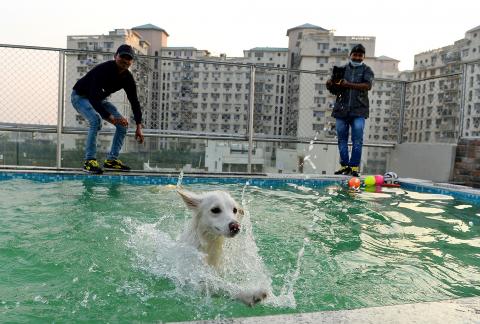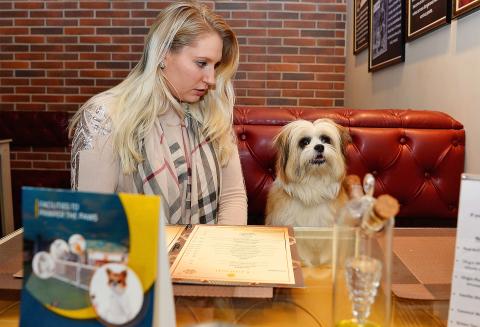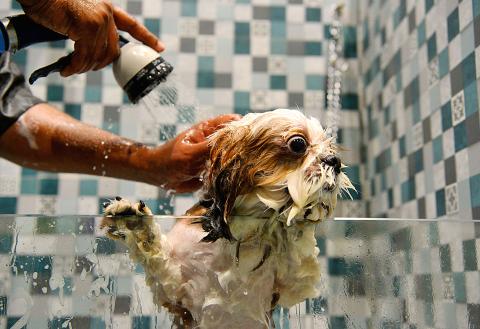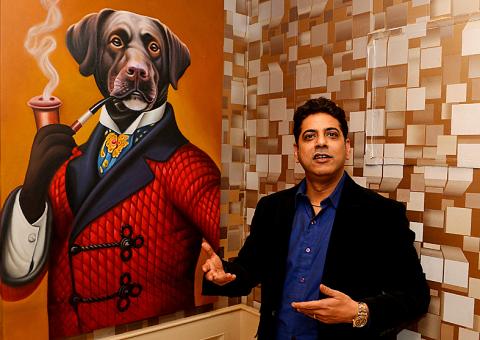Velvet beds, a relaxing spa, 24-hour medical care and non-alcoholic beers imported from Belgium: the life of a pampered pooch in India would leave many humans envious. Critterati, which claims to be South Asia’s first luxury hotel for dogs, offers suites at up to US$70 a night for pets whose “parents” will spare no expense to indulge their pride and joy.
A world away from the daily struggle to survive for India’s estimated 30 million strays, breeds such as St Bernards, Labradors and Lhasa Apsos can now enjoy the last word in canine coddling.
Chief executive Deepak Chawla opened Critterati in the New Delhi satellite city of Gurgaon to offer the wealthy an alternative to more down-at-heel facilities in India.

Photo: AFP
“No decent dog owner would want his dog to stay in those places,” he said.
The facility is riding a wave of growing love for pets as the Asian giant’s economy hits new heights. The number of household dogs in India has risen from two million in 2002 to an estimated 15 million last year — and is forecast to hit 26 million by 2021.
The top-of-the range Critterati suite offers a giant bed with velvet headboard, television and private dog-flap leading onto a balcony.

Photo: AFP
There is a swimming pool, a spa with ayurvedic massage oils and a vet on 24-hour call, while a medical unit with operating theater is being built.
A dog cafe serves rice and chicken and the menu also features muffins, pancakes and ice-cream — with bacon and vanilla a particular favorite — all washed down with non-alcoholic dog beer from Belgium.
LUXURY POTTY

Photo: AFP
Chawla says in standard kennels animals can be left alone for long hours.
“Here things are quite different,” he said. “It starts from 7am with potty breaks, then breakfast, then again a potty break, then play sessions for around two hours, then swimming sessions, then again play sessions, plus time in the cafe.”
Unlike the streetwise hounds waiting outside for scraps, Critterati clients have their every need met and their owners — many of whom refer to themselves as “parents” — think it is money well spent. Ashish Arora, a hotel chain executive, says he has no qualms about indulging Rubo the Labrador.

Photo: AFP
“He loves coconut water and vitamin water. He tells me he wants to eat chicken, so he eats it every day,” said Arora.
“I keep spending quite a bit. I don’t mind, it is like you are spending on a child.”
Chawla says his guests are worth the best.
“An animal is more loyal than human beings, they will do anything for us so they deserve it.”

The canonical shot of an East Asian city is a night skyline studded with towering apartment and office buildings, bright with neon and plastic signage, a landscape of energy and modernity. Another classic image is the same city seen from above, in which identical apartment towers march across the city, spilling out over nearby geography, like stylized soldiers colonizing new territory in a board game. Densely populated dynamic conurbations of money, technological innovation and convenience, it is hard to see the cities of East Asia as what they truly are: necropolises. Why is this? The East Asian development model, with

June 16 to June 22 The following flyer appeared on the streets of Hsinchu on June 12, 1895: “Taipei has already fallen to the Japanese barbarians, who have brought great misery to our land and people. We heard that the Japanese occupiers will tax our gardens, our houses, our bodies, and even our chickens, dogs, cows and pigs. They wear their hair wild, carve their teeth, tattoo their foreheads, wear strange clothes and speak a strange language. How can we be ruled by such people?” Posted by civilian militia leader Wu Tang-hsing (吳湯興), it was a call to arms to retake

This is a deeply unsettling period in Taiwan. Uncertainties are everywhere while everyone waits for a small army of other shoes to drop on nearly every front. During challenging times, interesting political changes can happen, yet all three major political parties are beset with scandals, strife and self-inflicted wounds. As the ruling party, the Democratic Progressive Party (DPP) is held accountable for not only the challenges to the party, but also the nation. Taiwan is geopolitically and economically under threat. Domestically, the administration is under siege by the opposition-controlled legislature and growing discontent with what opponents characterize as arrogant, autocratic

When Lisa, 20, laces into her ultra-high heels for her shift at a strip club in Ukraine’s Kharkiv, she knows that aside from dancing, she will have to comfort traumatized soldiers. Since Russia’s 2022 invasion, exhausted troops are the main clientele of the Flash Dancers club in the center of the northeastern city, just 20 kilometers from Russian forces. For some customers, it provides an “escape” from the war, said Valerya Zavatska — a 25-year-old law graduate who runs the club with her mother, an ex-dancer. But many are not there just for the show. They “want to talk about what hurts,” she